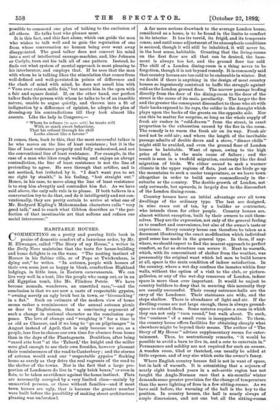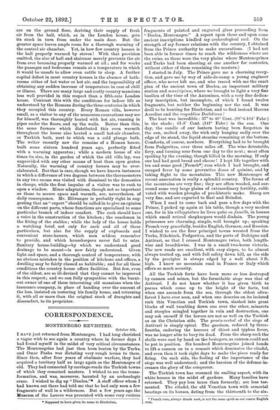HABITABLE HOUSES.
COMMENTING on a pretty and purring little book in praise of domestic comfort of a luxurious order, by Mr. H. Ellwanger, called "The Story of my House," a writer in the Daily News maintains that the taste for house-building and home delights is on the wane. "The nesting instinct of Horace in his Sabine villa, or of Pope at Twickenham, is dying out," he writes. "In autumn, people with houses of their own seem just as happy in bleak, comfortless Highland lodgings, in little inns, in Eastern caravanserais. We can live very well in a tent, like the people who camp out, or in an old Egyptian tomb, like Mr. Flinders Petrie. We have become nomads, wanderers, an unsettled race,"—and the conclusion is that we are now a caste of respectable gypsies, "owning merely an ugly brick box in town, or 'bivouacking' in a flat." Such an estimate of the modern view of home seems rather a reminiscence of the annual autumn picnic so dear to Englishmen, than a convincing argument of such a change in national character as the conclusion sup- poses. The love of change and "roughing it" for a time is as old as Chaucer, and if we long to "go on pilgrimages" in August instead of April, that is only because we are, as a people, less free to choose our own time for absence from home than in the days of the Plantagenet& Doubtless, after being "eased atte best" at the Tabard,' the knight and the miller were glad enough to see their own firesides, however pleasant their reminiscences of the road to Canterbury ; and the storms of autumn would send our "respectable gypsies" flocking home as surely as they drive the real vagrants of the road to the shelter of the towns. Nor is the fact that a large pro- portion of Londoners do live in "ugly brick boxes," or even in flats, to be taken as evidence against the home instinct. Flats are necessarily occupied by a very limited class—mainly by unmarried persons, or those without families—and if most town houses are ugly, that is because the greater number were built before the possibility of making street architecture pleasing was underatool. A far more serious drawback to the average London house, considered as a home, is to be found in the limits to comfort
in its interior. It has its torrid, its frigid, and its temperate zones; and until some adjustment of its atmospheric conditions is secured, though it will still be inhabited, it will never be, in the best sense, habitable. Granting that the living-rooms on the first floor are all that can be desired, the base- ment is always too hot, and the ground floor too cold The chill of a London dining-room is a thing never to be' forgotten, though it is not beyond remedy. It is commonly said that country houses are too cold to be endurable in winter. But we doubt if there is anything in the design of most country houses so ingeniously contrived to baffle the struggle against cold as the London ground floor. The narrow passage leading directly from the door of the dining-room to the door of the street is the cause of its main. peculiarity. The larger the fire- and the greater the consequent discomfort to those who sit with their backs exposed to its rays, the colder is the draught which plays upon the backs of the guests on the opposite side. Nor can this be matter for surprise, so long as the whole supply of fresh air rushes in " cold-drawn " from the street, in exact proportion to the exhaustion caused by the fire in the room.
The remedy is to warm the fresh air on its way. Fresh air need not be cold air; and where the length of the inevitable passage admits of double doors and a stove, "dinner chills might still be avoided, and even the ground floor of London houses be habitable. Want of space, owing to the high price of land, is the main cause of failure ; and the result is seen in a twofold migration, curiously like the dual migration of birds. We either ascend to seek a warmer climate in the upper regions of flats, just as the birds go up. the mountains to seek a cooler temperature, or we leave town altogether in order to build more commodiously in the suburbs or the country. The double growth of London, not only outwards, but upwards, is largely due to the discomfort. of the London dining-room.
Country houses have an initial advantage over all town dwellings of the ordinary type. The last are designed,' in nine cases out of ten, by a builder or contractor,.
who intends them for other people. Country houses are, almost without exception, built by their owners to suit them- selves. They are the expression, not only of the general feeling as to comfort and convenience, but also of the owner's taste or experience. Every country house can therefore be taken as a document illustrating the exact modification which individual good sense has made in the general type. In them, if any- where, we should expect to find the nearest approach to perfect comfort, so far as structure can secure it. Next to warmth, which, with its concomitant of shelter from the weather, was presumably the original want which led men to build houses at all, space is the main condition of indoor satisfaction. In the country, where a wet day confines the inmates within four' walls, without the option of a visit to the club, or picture- galleries, or any of the wet-day resources of London, indoor- space is more than ever important. It would be unjust to- country builders to deny that in securing this necessity they are usually successful. Their roomy entrance-halls are the envy of the Londoner. Their staircases are wide, and the steps shallow. There is abundance of light and air. If the- dwelling-rooms are not large enough, there is always ground- space to extend them. Some natures require a room in which they can not only "turn round," but walk about. To such, the " cosiness " of a small room is insupportable. To them, the country house offers facilities for obtaining cheaply what elsewhere might be beyond their means. The author of "The Story of My House" advises supplementary rooms for enter- tainment. Thus, he sententiously remarks, "it would be possible to avoid a barn to live in, and a cote to entertain in."
Permanence and solidity are not required for such an annexe.. A wooden room, tiled or thatched, can usually be added at little expense, and of any size which suits the owner's fancy.
Where English country houses fail is not in want of space, but in lack of warmth. It is astonishing that a sojourn of nearly eight hundred years in a sub-arctic region has not taught the Anglo-Norman race that a six-months' winter demands some greater provision for the change of temperature than the mere lighting of fires in a few sitting-rooms. As we have said before, the warming of the hall is the key to the position. In country houses, the hall is nearly always of ample dimensions, and not one but all the sitting-rooms
are on the ground floor, deriving their supply of fresh air from the hall, which, as in the London house, gets its stock in turn from under the main door. But the greater space leaves ample room for a thorough warming of the central air chamber. Yet, in how few country houses is the hall properly warmed by stoves ! With that provision omitted, the size of hall and staircase merely prevents the air from ever becoming properly warmed at all ; and for weeks the passages and bedrooms remain at a temperature in which it would be unsafe to allow even cattle to sleep. A further -capital defect in most country houses is the absence of bath- rooms either of hot water or hot air, and the impossibility of obtaining any sudden increase of temperature in case of chill or illness. There are many large and costly country mansions less well provided in this respect than a fifth-rate London house. Contrast this with the conditions for indoor life as understood by the Romans during the three centuries in which -they occupied this country. Every Roman villa, however small, as a visitor to any of the numerous excavations may see for himself, was thoroughly heated with hot air, running in pipes under the floors, and up the walls. Better than this, the same furnace which distributed this even warmth throughout the house also heated a small hot-air chamber, or Turkish bath, next to which was a cold plunge bath. The writer recently saw the remains of a Roman house, built some sixteen hundred years ago, perfectly fitted with a warming apparatus ; while a modern house of six times its size, in the garden of which the old villa lay, was unprovided with any other means of heat than open grates. Naturally, the warming of country houses may be over- :elaborated. But that is rare, though we have known instances in which a difference of two degrees between the thermometers in any two rooms was visited with dismissal to the domestics in charge, while the first impulse of a visitor was to rush to open a window. Minor adaptations, though not so important as those to secure space and warmth, are, nevertheless, of -daily consequence. Mr. Ellwanger is probably right in sug- gesting that an" expert" should be called in to give an opinion -on the different parts, whose functions are specialised to some particular branch of indoor comfort. The cook should have a voice in the construction of the kitchen ; the coachman in the fitting of the stables ; while the lady of the house holds a watching brief, not only for each and all of these particulars, but also for the supply of cupboards and convenient store-houses, which men seldom remember to provide, and which housekeepers never fail to miss. -Sanitary house-building—by which we understand good drainage to be meant—is now fairly understood. Given light and space, and a thorough control of temperature, with no obvious mistakes in the position of kitchens and offices, a dwelling may be fairly classed as habitable ; and for all these -conditions the country house offers facilities. Bat few, even of the oldest, are so ill-devised that they cannot be improved in this respect ; and we can fully sympathise with the burnt- cut owner of one of these interesting old mansions when the insurance company, in place of handing over the amount of the loss, insisted on restoring his family home, and returning it, with all or more than the original stock of draughts and discomfort, to its proprietor.







































 Previous page
Previous page